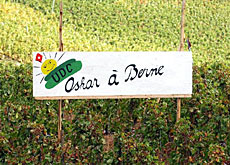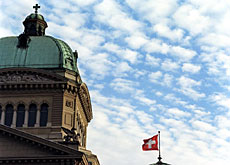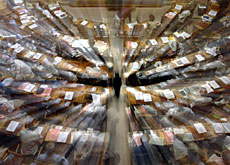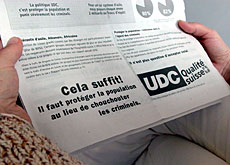Rightwing extends reach into western Switzerland

The success of the rightwing Swiss People’s Party in Sunday’s elections is largely down to the gains it made in French-speaking Switzerland.
The party won seven seats in the western part of the country – up from just two in the last election – bolstering its claims to be a truly national force.
Yvan Perrin, the newly elected People’s Party representative in canton Neuchâtel, says Sunday’s election result shows the party has extended its sphere of influence.
“Nobody can any longer accuse us of only being a German-speaking based party,” he told swissinfo. “In fact now I think the People’s Party is perhaps the only big national party in Switzerland.”
Political analyst Jeremias Blaser agrees. “It’s clear the People’s Party is a national force and one cannot argue any longer that it is only a regional phenomenon,” he told swissinfo.
Victory
But Blaser maintains that the gains in French-speaking Switzerland do not necessarily signal a victory for rightwing politics.
He says the party attracted support from Centre-right voters who were disenchanted with Radicals and Christian Democrats. Both those parties lost votes because, says Blaser, they failed to convince the electorate that they had anything new to offer.
“Over the past four years, the two centre-right parties have moved further to the Right on a lot of issues. Why should a voter choose either of them if they are basically defending the same policies as the People’s Party, if the real thing exists already.”
Blaser says the parties also failed to address important issues in the run-up to the election.
Failure
“I don’t think voters in French-speaking Switzerland have become more rightwing. It’s just that the two Centre-right parties failed to make clear where they stood on the issues that really mattered to voters, such as pensions, health, the European Union or asylum.”
Political analyst Andreas Ladner says he is not surprised that the People’s Party’s main gains were in western Switzerland.
“The party managed to win many more seats nationally than was expected. And it made a tremendous effort to win support in the French-speaking cantons.”
He added that the party also consolidated gains made in the German-speaking part of the country at the 1999 elections.
Myth
Perrin insists that Sunday’s vote put paid to the “myth” that voters from different language regions had different priorities.
Traditionally western Switzerland has been regarded as more open-minded and pro-European Union than the German-speaking part of the country.
Perrin says the results clearly show that French-speaking Switzerland faces exactly the same sort of problems as the rest of the country.
“We also have problems with foreigners and street hoodlums here in the French-speaking part of Switzerland,” he said.
“Those problems have increased over the past four years and the first step is to admit they exist and then to find a solutions.
“We are the only party that has been willing to address those issues.”
swissinfo, Jonathan Summerton
The Swiss People’s Party won 26.6% of the popular vote, and now has 55 seats in the House of Representatives.
Social Democrats: 23.3% with 52 seats.
Radicals: 17.3% with 36 seats.
Christian Democrats: 14.4% with 28 seats.
Greens (not in government): 7.4% with 13 seats.
The Swiss People’s Party won an additional 11 seats in the 200-member House of Representatives, making it the largest party in the House with 55 seats.
Seven of those seats were won in French-speaking Switzerland, including two in Geneva.
In eight years, the party has gone from being the smallest of the four in government to the largest.
The People’s Party campaigned strongly in favour of lower taxes, tougher asylum rules and against closer ties with the European Union.

In compliance with the JTI standards
More: SWI swissinfo.ch certified by the Journalism Trust Initiative



You can find an overview of ongoing debates with our journalists here. Please join us!
If you want to start a conversation about a topic raised in this article or want to report factual errors, email us at english@swissinfo.ch.